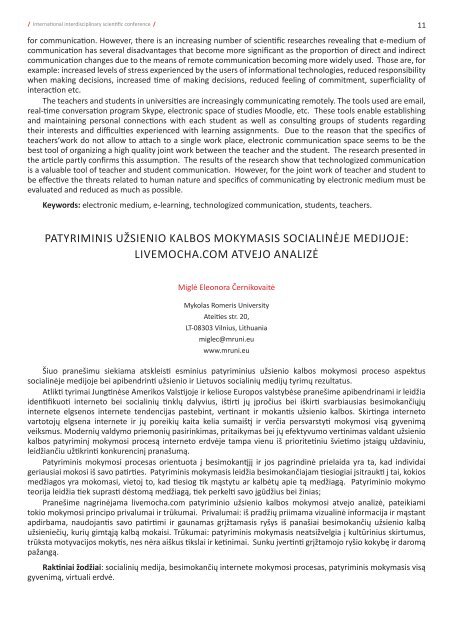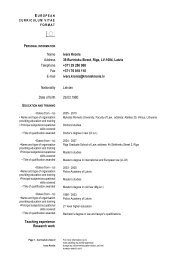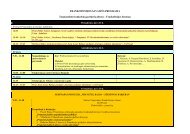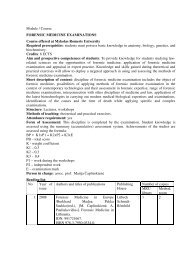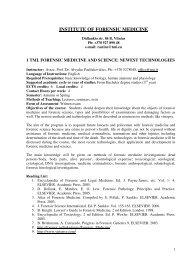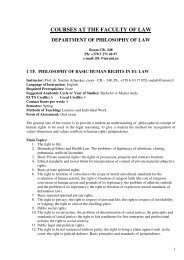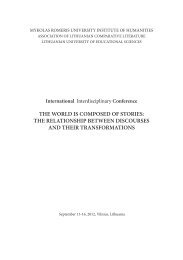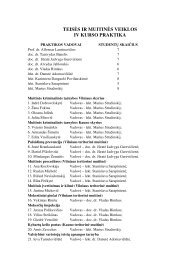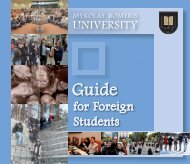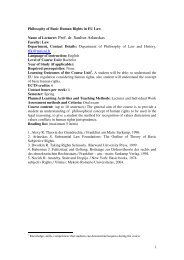SOCIAL MEDIA: CHALLENGES AND OPPORTUNITIES FOR ...
SOCIAL MEDIA: CHALLENGES AND OPPORTUNITIES FOR ...
SOCIAL MEDIA: CHALLENGES AND OPPORTUNITIES FOR ...
You also want an ePaper? Increase the reach of your titles
YUMPU automatically turns print PDFs into web optimized ePapers that Google loves.
International interdisciplinary scientific conference /<br />
for communication. However, there is an increasing number of scientific researches revealing that e-medium of<br />
communication has several disadvantages that become more significant as the proportion of direct and indirect<br />
communication changes due to the means of remote communication becoming more widely used. Those are, for<br />
example: increased levels of stress experienced by the users of informational technologies, reduced responsibility<br />
when making decisions, increased time of making decisions, reduced feeling of commitment, superficiality of<br />
interaction etc.<br />
The teachers and students in universities are increasingly communicating remotely. The tools used are email,<br />
real-time conversation program Skype, electronic space of studies Moodle, etc. These tools enable establishing<br />
and maintaining personal connections with each student as well as consulting groups of students regarding<br />
their interests and difficulties experienced with learning assignments. Due to the reason that the specifics of<br />
teachers‘work do not allow to attach to a single work place, electronic communication space seems to be the<br />
best tool of organizing a high quality joint work between the teacher and the student. The research presented in<br />
the article partly confirms this assumption. The results of the research show that technologized communication<br />
is a valuable tool of teacher and student communication. However, for the joint work of teacher and student to<br />
be effective the threats related to human nature and specifics of communicating by electronic medium must be<br />
evaluated and reduced as much as possible.<br />
Keywords: electronic medium, e-learning, technologized communication, students, teachers.<br />
PATYRIMINIS UŽSIENIO KALBOS MOKYMASIS <strong>SOCIAL</strong>INĖJE MEDIJOJE:<br />
LIVEMOCHA.COM ATVEJO ANALIZĖ<br />
Miglė Eleonora Černikovaitė<br />
Mykolas Romeris University<br />
Ateities str. 20,<br />
LT-08303 Vilnius, Lithuania<br />
miglec@mruni.eu<br />
www.mruni.eu<br />
Šiuo pranešimu siekiama atskleisti esminius patyriminius užsienio kalbos mokymosi proceso aspektus<br />
socialinėje medijoje bei apibendrinti užsienio ir Lietuvos socialinių medijų tyrimų rezultatus.<br />
Atlikti tyrimai Jungtinėse Amerikos Valstijoje ir keliose Europos valstybėse pranešime apibendrinami ir leidžia<br />
identifikuoti interneto bei socialinių tinklų dalyvius, ištirti jų įpročius bei iškirti svarbiausias besimokančiųjų<br />
internete elgsenos internete tendencijas pastebint, vertinant ir mokantis užsienio kalbos. Skirtinga interneto<br />
vartotojų elgsena internete ir jų poreikių kaita kelia sumaištį ir verčia persvarstyti mokymosi visą gyvenimą<br />
veiksmus. Modernių valdymo priemonių pasirinkimas, pritaikymas bei jų efektyvumo vertinimas valdant užsienio<br />
kalbos patyriminį mokymosi procesą interneto erdvėje tampa vienu iš prioritetiniu švietimo įstaigų uždaviniu,<br />
leidžiančiu užtikrinti konkurencinį pranašumą.<br />
Patyriminis mokymosi procesas orientuota į besimokantįjį ir jos pagrindinė prielaida yra ta, kad individai<br />
geriausiai mokosi iš savo patirties. Patyriminis mokymasis leidžia besimokančiajam tiesiogiai įsitraukti į tai, kokios<br />
medžiagos yra mokomasi, vietoj to, kad tiesiog tik mąstytu ar kalbėtų apie tą medžiagą. Patyriminio mokymo<br />
teorija leidžia tiek suprasti dėstomą medžiagą, tiek perkelti savo įgūdžius bei žinias;<br />
Pranešime nagrinėjama livemocha.com patyriminio užsienio kalbos mokymosi atvejo analizė, pateikiami<br />
tokio mokymosi principo privalumai ir trūkumai. Privalumai: iš pradžių priimama vizualinė informacija ir mąstant<br />
apdirbama, naudojantis savo patirtimi ir gaunamas grįžtamasis ryšys iš panašiai besimokančių užsienio kalbą<br />
užsieniečių, kurių gimtąją kalbą mokaisi. Trūkumai: patyriminis mokymasis neatsižvelgia į kultūrinius skirtumus,<br />
trūksta motyvacijos mokytis, nes nėra aiškus tikslai ir ketinimai. Sunku įvertinti grįžtamojo ryšio kokybę ir daromą<br />
pažangą.<br />
Raktiniai žodžiai: socialinių medija, besimokančių internete mokymosi procesas, patyriminis mokymasis visą<br />
gyvenimą, virtuali erdvė.<br />
11


